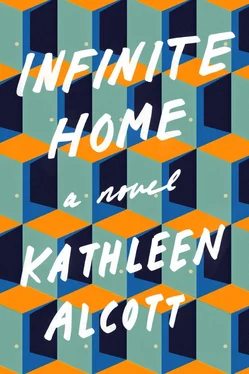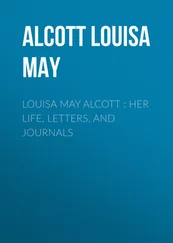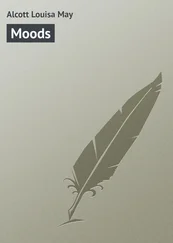AS A CHILD, Paulie had liked to wake his parents with song and, once his hands were able to manipulate the large carton, glasses of orange juice. He called his mother Lovebird and his father Mr. Sheep, after his other favorite soft but crusty-looking thing. They had adored the intensity of his glances and taken to calling him The King for the way he trounced around the house, assigning all objects an enthusiastic nomenclature. His teeth, so pointed, so white, always showing. And the singing: a song for the dishwasher, the morning, the cat, the routine appearance of the mail through the metal slot in the living room, the shifting colors of a laundry cycle.
Of course there were signs, of course there were, but Lydia and Seymour rarely had time to finish their conversation in the mornings, she brushing her teeth while sitting on the master bathroom toilet with her nightie bunched around her hips, preparing herself for the task of waking and guiding two children in picking clothing and eating breakfast, and Seymour at the sink splashing cold water in his eyes and clearing his throat. He was a good husband, that evident always, and he kissed her good-bye no matter what, and sometimes arrived to the office ten minutes late on account of hearing her troubling or wonder-filled dream. In any case: they loved Paulie, loved the dramatic curvature in his chest, loved his upturned eyes. They loved his inability to grasp the ambitions of villains in the films that flickered across his tiny body where he lay on the carpet.
With the beginning of school, it changed, and they could no longer misbrand his behavior as idiosyncratic. Lydia remembered it sharply for the rest of her life: How well it began, how she exhaled with relief when Paulie ran up to his kindergarten teacher — a woman who must have been trying to look like Ms. Santa Claus, a rope of white hair down her thick torso and wire glasses that clung to the tip of a diminutive nose — and introduced himself. How impressed the woman had been when Paulie spoke: “Hello there, I’m here to learn and laugh, if you don’t mind, my darling!” But within two weeks the phone call. Paulie had come out of the bathroom with his pants down several times and politely requested the teacher’s help; he could not participate in an activity wherein she asked the students to draw simple shapes. Lydia had begun to protest, but Ms. Susanne had interrupted gently: “I’m not saying he refused to, Ms. Fontaine, or that he tried but his coordination was below average. I’m saying that he looked at his pen and paper and he looked at the blocks in front of him and he looked at the other children and he plainly could not .”
Lydia did not tell Seymour for a full two days. When he came home from work, he was tired and slow, and quite often the only thing that visibly cheered him was Paulie. Paulie balancing on his leg; Paulie offering impersonations of a humpback whale, a jet plane, a Christmas tree. So when she finally did it was unplanned, it just came out, while she was sitting on the closed toilet watching him shave, in sobs that attempted words and reverted to sounds. Once he’d comforted her enough to understand what she was saying, he called in sick and tucked Lydia into bed; he promised that when he returned, they would figure it out, and he took Claudia to school.
He let Lydia sleep most of the day, and in all the time she was out she hardly changed positions under the great white comforter. Through the morning and afternoon he watched Paulie, held his hands and then his feet, listened as his son told him a story about an elephant searching for a tree large enough to shade his mother during the summer. “Where did you hear that story,” Seymour asked, though he already suspected the answer. “From my daydreams, of course!”

EDITH AND DECLAN had always prided themselves on their taste in people. Their renters, mostly blue-collar and from somewhere else originally, paid on time and stopped to say hello to each other in the hall; they held doors, gave away laughter freely and sat out in the overgrown back garden in the summer together, sharing sun tea and simple sandwiches. For a full decade, theirs was the most-attended Fourth of July party in the surrounding blocks. Declan would weave among the tenants and their friends, a lit sparkler attached to his thin silk tie, spilling whiskey into glasses without asking, butchering patriotic adages with his thick Irish accent in a way that left his guests cackling.
Declan made himself available to his tenants, and so did Edith, although after he died she began widening the scope of her generosity, drawing leases to those she found unusual, or hurt, or in visible need of asylum. She knew what he would have said, how he would have bit down on his smoke and brought a palm over his cheek — that it wasn’t her job to mother the world, no matter what regrets she had about their own children. But he was gone and that was his fault, she reminded herself frequently, for living hard on his body like he had. He could have quit the cigarettes, could have downed a few more vegetables, could have ended a few nights without landing in the bed like a felled pine.
For a year she rented to an out-of-work opera singer with hollowed-out cheeks who was always late with the rent but put on a suit every morning and practiced his scales. A single mother of twins famed for her colossal Afro and her abilities as a wrist wrestler, who often accepted Edith’s offer to babysit while in her apartment she held raucous tournaments attended by bearded men in loud prints. A substitute teacher with a quivering Adam’s apple and a stutter and a little beagle that forever ran ahead of him. A balding snake collector always clad in Hawaiian shirts, who claimed no one else would rent to him, and who cooed into his many cages like a proud father. An Ecuadorean widower who worked construction and came home almost unrecognizably dusty and who nervously patted the front pocket where he kept his wife’s photo. A retired Barnum and Bailey performer who had asked Edith if, for the sake of old times, he could hang a tightwire across the backyard. She had obliged him, and spent a number of spring evenings with a shadow plaid blanket around her shoulders, clapping as his toes gripped the line and he blushed with remembering, as he brought one gnarled foot in front of the other and hovered four inches above the long untended flower beds, perfectly still, waiting for a strong breeze to pass.

HAD SHE FELT ANGRY about how far removed she’d grown from the world as everyone else knew it, Adeleine might have placed the fault on the ages of her parents when they conceived her (forty-two and fifty-three) and the cultural diet they’d fed her, a closed world of musty books and antiquities; but, like most people growing ill in mind, she did not feel in any way ashamed of what she deemed preference. Her rejection of modern society and her collection of previous eras’ talismans thrived like weeds, without any cultivation, at a rate she couldn’t control.
Edith advertised only through physical postings in a five-block radius of the building, and Adeleine had detached the unevenly perforated slip with great anticipation, happy for what she could touch and hold. Finding an apartment without consulting the many efficient tentacles of the Internet had grown next to impossible, and she signed the lease without looking anywhere else.
Over time, her apartment came to appear smaller than the others in the building — so overcrowded did it become with adopted velvet ottomans and other people’s photo albums and a variety of barely functional mechanical devices — though it was actually the largest. She had adored it straightaway, the crown-molded archway between the kitchen and living room, the claws of the forever slightly dirty bathtub, the scratched hardwood floor, the rusted fire escape available through the window in her bedroom. Bit by bit, she filled the space with bygone decades, even the most utilitarian items — the fans and egg whisks and combs — older than her father or mother. She collected until the point when she couldn’t make it more than a block before turning around, her gaze fixed on her windows, and trotting back towards their promise. It was as though she knew she would soon be without any external entertainment: she attended every stoop and estate sale, showed up early and bent her body towards the boxes others ignored, took buses to time-stopped reaches of Queens and then trains upstate, under each arm an empty, beaten duffel bag.
Читать дальше













